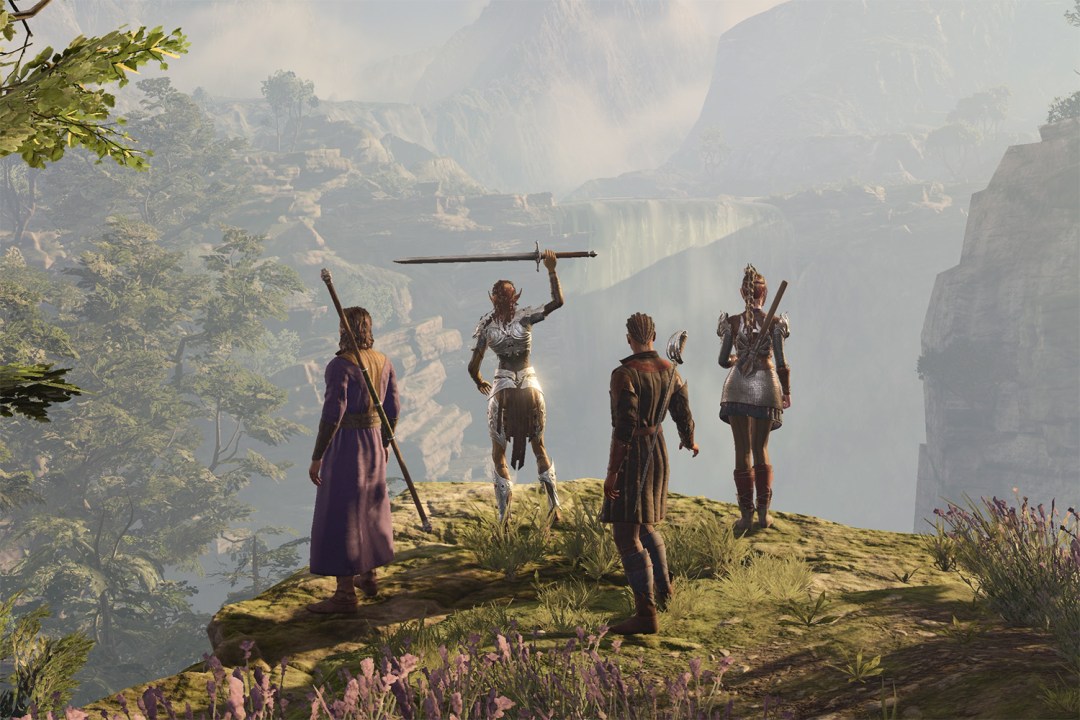Baldur’s Gate 3 review: roll with it
Dungeons & Dragons role-playing at its finest and most ambitious

It’s been more than 20 years since the last Baldur’s Gate instalment revitalised computer role-playing games, ahead of consoles and big-budget 3D action RPGs showing up to dilute the genre. How many games can say they’ve been decades in the making? Certainly none that are as eagerly awaited as Larian Studios’ latest effort.
Baldur’s Gate 3 faithfully follows the fifth edition Dungeons & Dragons rules, just as the pen-and-paper version is seeing a resurgence – helped in part by the developer’s own Divinity: Original Sin series, which broke new ground for player freedom. But even if you’ve never picked up a D20 dice, you won’t need to mull over thick rulebooks to immerse yourself in the most majestic imagining of the Forgotten Realms to date.
Beyond some incredible storytelling depth, the way you’ll influence and affect outcomes through personal choices will keep you deeply invested in one of the most epic role-playing games ever conceived.
Where’s the party at


It doesn’t matter if you’re coming to the series for the first time; Baldur’s Gate 3 is set a century after the events of the previous game, with an (almost) entirely new cast. You can create your own character, or play as one of the fantastic pre-set ones such as sneaky vampire Astarion, Githyanki warrior Lae’zel, or half-elf cleric Shadowheart. All can also be recruited as party members later.
Moulding your own character is part of the role-playing experience, of course – whether it’s someone who looks like you or whatever you can wildly imagine role-playing as, which doesn’t only include races but also what they’ve got under their pants. These details are also hugely visible in-game thanks to a camera that can be moved from the classic top-down angle to something close to a third-person action game, as well as cinematic and dialogue cut-scenes.
Classes and proficiencies also affect how you’ll experience the Forgotten Realms. While many RPGs often weigh heavily on combat, a fairly low level cap means you’re not grinding battles here. It’s often more favourable to be a silver-tongued rogue who can blag their way out of a fight, though sometimes brute force and intimidation have their advantages in settling disputes. If you think you’ve boxed yourself in a corner from your starting choices, it’s possible to respec as you play – or defer to another party member better equipped for the situation.
It’s the relationships you build with your party that matter most, and not just because it’s possible to romance all of them. They’re a terrifically diverse mismatch of personalities and loyalties. The one commonality? Along with your protagonist, they’ve all been abducted by an eldritch race of Mind Flayers and infected with a tadpole that will eventually transform you into their tentacled slaves.
It’s fun listening to party members bicker on the long road to the titular Baldur’s Gate, but just as camaraderie might blossom into love, other choices can just as easily lead to irreconcilable differences that turn companions into enemies. We made several fatal mistakes in early quests that had us killing potential party members before they had the chance to join our crusade.
Do or dice


Agonising over the moral implications of your choices doesn’t necessarily decide the outcome. It also hangs on chance, manifested by a roll of the iconic twenty-sided dice during the game’s many skill checks. From picking locks to persuading someone to come around to your way of thinking, you have to roll a minimum score to pass.
Similar checks also happen passively as you explore. Different abilities assigned to your character have different effects on how you experience the world. Failing a check on religion means you pass by a statue of a deity without any insight, whereas a successful perception check might reveal a character you’re talking to has something they’re hiding from you.
That translates to the turn-based battles, where the hit chances can feel as brutal as a round of XCOM. It feels especially true early on when your party is very inexperienced, but holds true hours later. Whether a character is skilled with ranged attack, what height terrain you’re attacking from, and other buffs that might not be immediately apparent can make combat feel like you’re just barely scraping by.
It’s the kind of chaos table-top players will be familiar with, yet while any hardcore role-player may be compelled to leave their fates in how the dice rolls, it’s all too tempting to just reach for the quick save and re-load until you get the result you want. We’ve certainly been guilty of it in our playthrough, as the hours racked up according to our Steam account keep getting further away from the hours logged on the game file itself.
On the road


While Baldur’s Gate 3 comes from the rich lineage of PC RPGs, it plays just as capably on controller, with the UI instantly changing based on what input is registered from, and even changes to PlayStation or Xbox inputs depending on the controller you’re using. Nonetheless, keyboard and mouse players have a greater advantage accessing spell, ability and inventory shortcuts. And while it might feel better being able to control your character with an analogue stick, there’s still niggles to contend with, such as still having to use a cursor to jump or awkwardly positioning the camera to interact with tiny items.
But then this isn’t an action RPG. The game favours care and caution investigating the world and story, and on this front it absolutely delivers. Even simple A to B goals have branching paths that lead to perilous shenanigans, often dragging you into conflicts where you’re forced to pick a side that might upset someone in your party. The whole time, a delicious narrator is serving the dungeon master role. There are secret caves to explore, murder mysteries to solve, and tyrants to overthrow. You might just be unfortunate enough to walk in on a bugbear getting intimate with a troll. Even when we finally arrive at Baldur’s Gate itself 60 hours in, the campaign only continues to expand with the arrival of some truly scene-stealing villains.
And that’s just from a single playthrough. having seen snippets of other players’ discoveries, you can be certain no two playthroughs are at all alike. It’s dizzying just how much care and attention has been poured into every little intricacy, so that even your most hare-brained ideas will actually work. Baldur’s Gate 3 is the western RPG equivalent to Zelda: Tears of the Kingdom in terms of storytelling.
Baldur’s Gate 3 verdict


Baldur’s Gate 3 is nothing short of a marvel. This landmark for role-playing games goes back to the source to create the most faithful digital D&D campaign ever, with all the pomp of a cinematic blockbuster but refusing to compromise the breadth and depth of role-playing choice. Larian has firmly placed itself firmly in the pantheon of RPG all-timers.
Console and more action-oriented players will need to adapt to its ways, but these are forgivable given the staggering scope and imagination of its storytelling, and how you get to shape it. This may be the Forgotten Realms, but your adventures will be unforgettable.
Stuff Says…
Richly engrossing and ridiculous in scope. The grandest D&D role-playing game ever made
Good Stuff
A faithful D&D campaign that looks amazing
Richly written story and characters
Unfathomably deep player choice
Bad Stuff
A little more awkward to play with a controller
Save-scumming gets a bit too tempting
